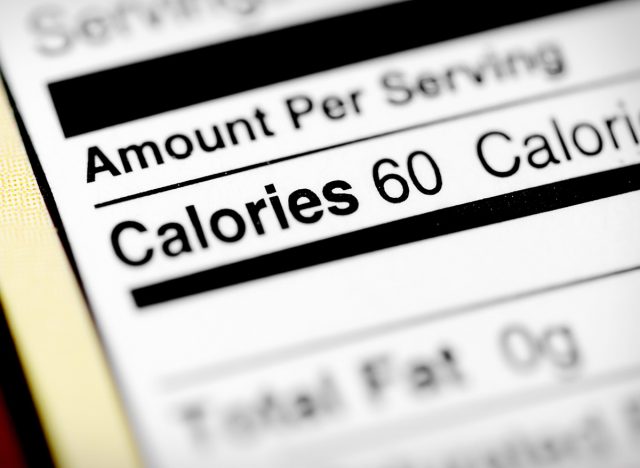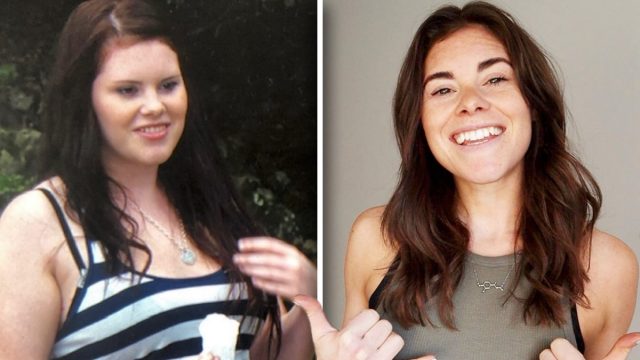I Dropped 66 Pounds Following These 5 Simple Rules
Do you want to lose weight but aren't sure where to start? Lucy Lismore is a personal trainer and fitness influencer who shares content about "all things calisthenics, movement, outdoor adventure, travel and spending too much time upside down!" In one of her viral videos, she shares her plan on how to kickstart your weight loss journey. "In today's video, we're gonna be talking about just how to get started on your weight loss or your fitness journey," she says at the beginning, revealing that she lost 66 pounds and has managed to keep it off for years. "Prior to that, I spent years not taking the first step or not starting anything because I was overanalyzing everything, and I felt like I would be taking the wrong step or I just didn't know what to do," she continues.
Rule 1: Get Your Goals, Starting with an "Overarching" Goal
"Number one, and I'm sure you would've heard this before, but it is really important, is to set your goals," she says, recommending an "overarching" goal, "one big main goal that you're working towards." This could be to lose a certain amount of weight or do a certain exercise," so like, for example, a pushup or a pullup, or it might be a little bit more general than that."
Now, these smaller goals might be building up to work towards that big one, but they also might be individual on their own. So there just might be small little wins like being able to run one kilometer or plank for one minute or losing a certain amount of weight or a certain measurement, for example. So it's all good having those goals, but what we really want to understand is why we have those goals, and you should be digging deep into the reason behind them.
Also, Write Down Reasons Behind Specific Goals

She recommends writing them down on a piece of paper and also "start to jot out the real reasons behind those specific goals," she says. "Make sure that those reasons are valid to you and they're not because of other people. And really focus on the benefits that you could get from achieving those goals. Really focus on exploring the points that you've written down and really think about expanding on those points."
You Don't Need to Look at Them Every Day
"You don't need to look at them every single day, but just have them there and just start off on the right foot. I did this and never ever looked at them again, but I'm glad I wrote them down, and I had that overarching goal and the smaller goals, and even though I didn't really revisit them, and to be honest with you, they changed along the way," she says. "Anyway, I was glad I wrote them down because it just felt like that was the start, and that was the first step."
Rule 2: Get Started by Getting Into a Caloric Deficit

"Point number two is to literally just take the first step and get the ball rolling," she says. "If you want to lose fat, you need to have a calorie deficit. There's a couple of ways that you can achieve a calorie deficit," she says. You can do this by either consuming fewer calories than your body is burning, "and that means you'll be in a deficit here, or you can exercise burning calories, creating a deficit as well," she says.
Exercise More or Eat Less

The two ways to do this? Either "exercise more" or "eat less," she says. "The easiest way really to do it is just to eat in a calorie deficit. So, eating fewer calories than your body is burning. The key point here, though, is consistency. So you need to be doing this consistently enough over a longer period of time." You can do this by eating less, moving more, or both. "It's completely up to you, depending on the type of person you are."
Calculate Your TDEE
If you'd like to know how many calories your body is burning per day, you can calculate your TDEE and then consume fewer calories or burn more than that. "Remember, nothing is set in stone, and this is very much a learning process, and you will learn along the way. It's just like anything. It will change all the time. You'll find different things that work for you, but the principles are always going to be the same," she says.
Rule 3: Take Your Progress Markers

Next, "something that you really need to do is to take your initial measurements and your progress markers, and I'm not just talking about weight here because I know we automatically assume that weight is the key indicator, and obviously, if you are looking for weight loss or fat loss, then weight on the scale is traditionally what we think is going to be the main key indicator of that," she says. However, she isn't a "fan" of that being the main marker. "I don't weigh myself," she says.
Take Progress Photos

"Other methods you can use are progress photos," she says, noting that it's a "fantastic way of measuring your progress" because it "doesn't just show changes in your size but also changes in your appearance, the way you sort of hold yourself, your mood, even changes in your posture."
You Can Take Physical Measurements Too

She also recommends physical measurements. "Just get yourself measuring tape. Take several measurements, from waist to hips, chest, arms, and thigh; that's all you need to do. Then put it away, take it in another month or so," she instructs. "Quite often, the weight might stay the same on the scales, or it might even increase, but you might have lost centimeters or even inches in your measurements. So it's always fantastic to have that on hand." You can also see how your clothes fit or write down in a journal how you feel. "I mean, obviously, it's gonna fluctuate every single day throughout your life, but you may notice a positive effect on things like how you're sleeping or generally how you feel about yourself or how much energy you have throughout the day," she says.
Rule 4: Stop Overthinking It
"Point number four is not to overthink it. What I'm talking about here, though, is overthinking the future, overthinking the day-to-day. Try to think about this, like I said, as a lifestyle rather than a short-term change and accept that it will take time to see progress and that you should really be enjoying what you're doing," she says.
Be Consistent

"I can't stress enough how much consistency is key. Consistency really is the most important thing. So just accept that what you're doing is right and just keep going with it. Don't give up after a week, two weeks, or even four weeks or six weeks because you've not seen exactly what you expected. Sometimes, our expectations are a little bit high. We are quite harsh on ourselves. So try to be realistic and just focus on enjoying what you're doing rather than the end goal," she continues.
RELATED: 5 Foods I Eat Every Day That Helped Me Keep Off 135 Pounds Weight Loss
And, Don't Compare Yourself to Others

And "even more so, stop comparing yourself," she says – especially to people on social media. "We start to invest a lot of time looking at other people that are in our, in a similar position to us or have been, and we follow their journeys or we track what they're doing and follow what they're doing. And sometimes it can be really motivational, but sometimes over a period of time that motivation starts to become comparison and we don't realize we're doing it." Generally, "it's really important to remember again why you're doing it and to focus on yourself and your own journey and doing what works for you. So if you notice that you have negative feelings after consuming someone's content or spending time with a certain person, it's best to try and reduce the amount of exposure you have to that."
Rule 5: Stay Consistent
"Point number five is just to be consistent, to keep going, to stop overthinking it, and just keep moving forward. Trust the process, trust what you're doing. Stop overthinking every little thing that happens. Stop looking for progress straight away or expecting changes to happen immediately because it won't happen. Stop expecting to be motivated every day because it's not gonna happen either. And just really try and enjoy it," she says.
Educate Yourself

"Educate yourself around principles of nutrition and exercise. Continue learning. This is a fantastic way of staying committed because once you understand how something works, it becomes a whole lot easier, and you trust the process a lot more. And that's the same with anything in life. It's not just weight loss or a fitness journey. For example, maybe talk to some people who are in a similar position to you. That could be online forums, a group in your sort of community, or your friends and family. Just find out something that works for you and just stay consistent."
Just Take the First Step
"You don't need to have everything perfect and ready to go. It's all about taking that first step. So stop procrastinating, stop analyzing, and try to wait for the perfect time. Take that first step and learn along the way and enjoy the process as much as you can, and it will be a whole lot easier, and at least you'll be working towards it," she concludes. And if you enjoyed this article, take advantage of these 15 Quick Ways to Lose Body Fat Percentage in a Week.





